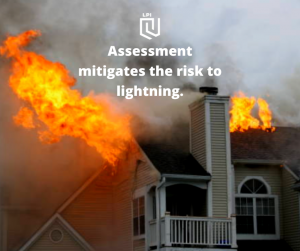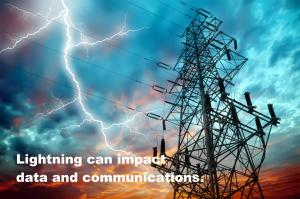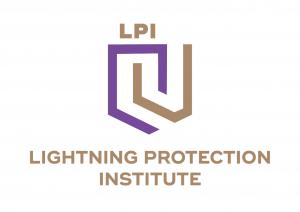The Lightning Protection Institute Urges Assessment of Lightning Strike Risks for Homes and Businesses
Increasing lightning strikes. Rising insurance claims. Assessment mitigates the risks to individuals, homeowners, and businesses.
Mitigating the risks of lightning strikes starts with a thorough assessment before a storm.”
LIBERTYVILLE, ILLINOIS, UNITED STATES, June 20, 2024 /EINPresswire.com/ -- As lightning strikes become increasingly common, the Lightning Protection Institute (LPI) emphasizes the importance of assessing and mitigating the risks posed by lightning to homes, businesses, and communities.— Tim Harger, Executive Director at LPI
//Understanding THE IMPACT of Lightning Strikes.
The incidence of lightning strikes has been rising annually, coinciding with the expansion of our electrical grid to incorporate new power sources like solar and wind energy. Our growing dependence on electricity heightens our vulnerability to lightning-related damages.
When lightning hits an unprotected building, the energy can spread through walls and pipes, impacting vital components we rely on daily: water, electricity, computers, security systems, and more. Lightning Safety Awareness Week (June 23-29) serves as a critical reminder of these dangers and the necessary precautions to protect ourselves and our properties.
//PERSONAL and ECONOMIC RISKS.
Lightning strikes can cause severe personal injuries, including burns and potentially fatal outcomes. For property owners, the initial concern is often fire; however, the repercussions extend far beyond. A single strike can disrupt electric systems essential for business transactions, production lines, and communication, leading to significant business interruptions and revenue loss during repairs.
"Mitigating the risks of lightning strikes starts with a thorough assessment before a storm. Lightning protection systems play a crucial role in safeguarding homes, businesses, and communities from the potential downtime and destruction caused by lightning strikes," said Tim Harger, Executive Director at LPI.
//The Key to Mitigating Risks: ASSESSMENTS.
LPI strongly encourages individuals to assess their risk of a lightning strike to safeguard their homes, businesses, and communities. This assessment includes evaluating the situation BEFORE a storm.
For personal safety, the LPI recommends: Assess your risk of lightning before leaving for an outside event; check weather apps and radar maps. Once at an event, make a plan on where to go if there is thunder. If you hear thunder, seek shelter immediately.
For business owners and the design/build community, this evaluation involves conducting a simple assessment per the NFPA 780 standard. Where is the building located - What is the flash density of the area? Vaisala Xweather can provide the latest lightning data for your location. What is surrounding the building - is it one of the highest points? What processes or procedures are happening “inside” the building that need to be protected (ie. data centers, distribution centers, or critical facilities)? These are just a few of the parameters from NFPA 780 to consider.
This assessment may indicate the need for a lightning protection system, which is scientifically proven to mitigate lightning strike risks. Certified installers and third-party inspections (LPI-IP) ensure these systems function correctly.
//Protecting OUR COMMUNITIES.
Communities depend on critical facilities, such as fire stations, hospitals, police stations, government buildings, and emergency operation centers, to provide essential services daily and during disasters. These facilities, especially in high-risk areas, should be equipped with lightning protection systems to enable first responders to serve the community effectively.
//INSURANCE Trends Highlight INCREASING Lightning Claims.
The insurance industry has noted a substantial rise in lightning claims. According to the Insurance Information Institute (Triple-I), national insurance claims data reveals:
-The total value of lightning-caused U.S. homeowners insurance claims rose by over 30% in 2023, totaling $1.27 billion, compared to $950 million in 2022.
-The number of lightning-caused U.S. homeowners insurance claims increased by 13.8%.
-The average cost per lightning-caused claim surged by 14.6%, from $15,280 in 2022 to $17,513 in 2023.
Sean Kevelighan, CEO of Triple-I, remarks, “Rising inflation, including higher replacement, construction, and labor costs, impacted claim costs for the year. Lightning Safety Awareness Week highlights the dangers lightning poses to life and property and how insurers and policyholders are reducing these risks through effective mitigation efforts.”
//ASSESS and PROTECT.
With thorough assessment and appropriate measures, individuals and businesses can protect themselves from the severe impact of lightning strikes.
About the Lightning Protection Institute:
The Lightning Protection Institute is dedicated to promoting lightning safety and providing education on effective lightning protection methods. For more information, visit lightning.org.
About the Insurance Information Institute (Triple I):
Triple-I is the trusted source of unique, data-driven insights to educate, elevate, & connect.
More information at www.iii.org
Lightning Protection Institute
LPI
+1 800-488-6864
email us here
Visit us on social media:
Facebook
LinkedIn
Instagram
Legal Disclaimer:
EIN Presswire provides this news content "as is" without warranty of any kind. We do not accept any responsibility or liability for the accuracy, content, images, videos, licenses, completeness, legality, or reliability of the information contained in this article. If you have any complaints or copyright issues related to this article, kindly contact the author above.



